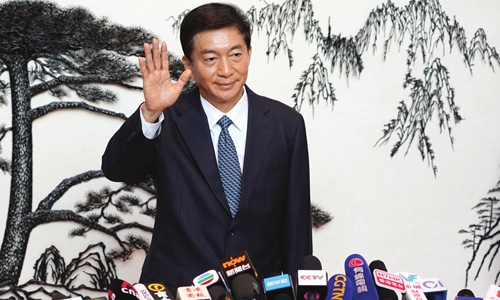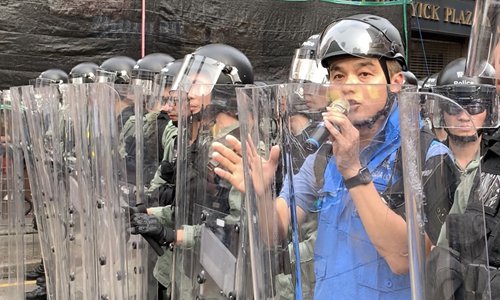HOME >> CHINA
HK office’s role enhanced
By Chen Qingqing and Leng Shumei Source:Global Times Published: 2020/1/6 22:38:41
New head comes with changing roles, more engagement

Luo Huining, the newly appointed director of the Liaison Office of the Central People's Government in the Hong Kong Special Administrative Region, holds a press briefing on Monday morning. Photo: cnsphoto
The liaison office of the Chinese central government in Hong Kong is expected to play a more active role in engaging with Hong Kong society in a more creative way instead of simply being a channel of communication as its new head took office on Monday to help the city engulfed in violent protests to return to the right path.Luo Huining, the new director of the Liaison Office of the Central People's Government in the Hong Kong Special Administrative Region, came under the spotlight as he spoke with reporters in Hong Kong on Monday morning for the first time since he was appointed by the State Council, China's cabinet. The 65-year-old, who previously served as Party chief of Northwest China's Qinghai Province and North China's Shanxi Province, is considered politically mature and capable of working with the Hong Kong Special Administrative Region (HKSAR) government to handle the city's dilemma.
Located in Sai Wan district, the liaison office was first established as the Hong Kong branch of the Xinhua News Agency. After Hong Kong returned to China, the central government renamed it in 1999 and gave it more functions, such as coordinating authorities like the Commissioner of the Ministry of Foreign Affairs of China in Hong Kong and the Hong Kong Garrison of the Chinese People's Liberation Army, helping relevant authorities to manage Chinese institutions and acting as a bridge to promote cooperation between the mainland and Hong Kong in different areas.
However, it has come under tremendous pressure since the outbreak of anti-government protests in mid-June 2019. Radical protesters not only defaced and vandalized the office building on July 21, but also challenged Beijing's authority and posed as a blatant threat to safety of all employees of the office. The office, which was criticized for misjudging the situation in Hong Kong, has been blamed for isolating itself from the majority of Hong Kong society, Reuters reported in November 2019.
The criticism, which came not only from Hong Kong society but also from the mainland society, also gives a hint to challenges while carrying out the "one country, two systems" principle - a political arrangement with no parallel in history.
Dealing with the relations between "one country" and "two systems" has led to major divergences between the mainland and Hong Kong, as the city has been pursuing a higher degree of autonomy while the mainland upholds the country's sovereignty over it, and the liaison office has been exploring how to reach a balance between them, analysts said.
Some office employees who talked to the Global Times on condition of anonymity said they have been anxious, heartbroken sometimes, working day and night in the past few months.
"A lot of reflection has been done, especially in some areas we have not done enough," an employee said, noting that growing challenges, however, have not deterred them from working together and finding a way out together with the HKSAR government.
Another employee said Luo's remarks on Monday morning represented a shared vision and hope of all liaison office staff. At a short press briefing, the new chief expressed strong willingness to get his job done with sincerity and true feelings for the city, firmly believing that the Constitution and the Basic Law are fully enacted in Hong Kong.
Luo also noted that "one country, two systems" will be implemented stably in the long run, and the prosperity and stability of Hong Kong will be ensured.
Although he has not been engaged in Hong Kong and Macao-related work, Luo has rich experience in local administration, Tang Fei, a member of the Council of the Chinese Association of Hong Kong and Macao Studies, told the Global Times on Monday.
"His assignment shows the central government hopes to make a breakthrough while moving steadily in Hong Kong-related work," Tang noted.

A Hong Kong Police Force media liaison officer speaks at a protest site. Photo: Courtesy of Hong Kong Police Force
Changing roleCompared to former heads of the liaison office, Luo came to Hong Kong as an "outsider" who has little connection with the city and the Hong Kong and Macao Affairs Office, but with abundant experience in political affairs, as the situations in both Qinghai and Shanxi were complicated, especially the latter, which had seen a massive anti-corruption campaign before his tenure, analysts said.
While Jiang Enzhu, the first director of the liaison office in the 1990s was a diplomat, which helped facilitate the handover of the city from Britain to China, and Wang Zhimin, Luo's predecessor, who had been dealing with the months-long social unrest, have worked with Hong Kong and Macao-related authorities, Luo is expected to play a more active role in considering Hong Kong affairs from a larger picture by integrating local demands with the motherland's development.
"Previously, the liaison office had put too much focus on 'two systems' to ensure the city's high degree of autonomy. It's now time to reiterate 'one country,' as it always goes first," Li Xiaobing, an analyst on Hong Kong, Macao and Taiwan studies at Nankai University in Tianjin, told the Global Times on Monday.
How to strengthen a relatively weak presence of the liaison office in Hong Kong society also remains a major task for the office's future work. While "one country, two systems" is a new political arrangement, the role of the liaison office could be creative, analysts said.
"It will make some adjustments under Luo's leadership, including their changing relationship with the Hong Kong SAR government, for example, to be politically responsible for the government's decision," he said.
For example, Hong Kong public servants continue to uphold the principle of 'political neutrality,' which means they are not responsible for any side. This inherited from the British occupation period. Such a political stance could not meet the demands of "Love the Country, Love Hong Kong," as work principles, and the liaison office could give more instructions on this aspect, Li explained.
Future work
Luo's appointment was also the first personnel change since anti-government protests began, which was hailed as "the most significant one" in media reports.
It also signals the central government's system of governance over the city in accordance with the "one country, two systems" principle and the Basic Law.
"'One country, two systems' is Hong Kong's biggest advantage," Luo stressed at Monday's press briefing.
In some domains where the liaison office has not done enough, including fully reaching out to different social spheres and talking to the young generation, more efforts should be made, analysts noted.
"It's necessary to promote national education and engage more Hong Kong youngsters in the development in the Guangdong-Hong Kong-Macao Greater Bay Area to increase their sense of national identity," Tang said.
Posted in: DIPLOMACY